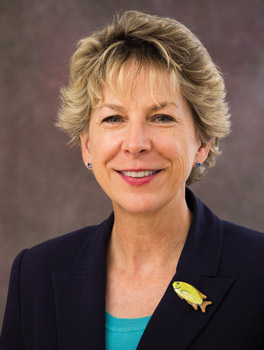Longwood-affiliated organization marks 20 years of cleaning up Virginia’s waterways

Katie Register is executive director of Clean Virginia Waterways, which is affiliated with Longwood University and the Ocean Conservancy. Clean Virginia Waterways is funded entirely from gifts, workshop fees and grants from foundations including the Chesapeake Bay Restoration Fund.
A Longwood-affiliated organization devoted to keeping Virginia’s rivers, streams and beaches free of trash is celebrating its 20th anniversary this year.
Clean Virginia Waterways (CVW), founded in 1995 and housed on the Longwood campus since 1999, coordinates the Ocean Conservancy’s International Coastal Cleanup in Virginia; conducts research on issues that affect waterways, for example the devastating environmental impact of cigarette butt and balloon litter; and provides community education programs such as rain barrel workshops.
(Read more about CVW’s transformative work)
“We have trained more than 160 nonprofit groups in how to conduct rain barrel workshops,” said CVW Executive Director Katie Register, adding that the barrels capture rainwater, which then can be used for a multitude of purposes. “Thousands of rain barrels, made from pickle barrels, are all over Virginia thanks to our leadership.”
In addition, CVW provides internships for up to six Longwood students annually from various disciplines, giving them valuable experience in scientific research and nonprofit organizational management. Many students have participated in a research program that monitors the quality of local waterways in partnership with Dr. David Buckalew in the Department of Biological and Environmental Sciences.
CVW, a nonprofit organization, started when Register, then a graduate student at George Mason University, was asked to become the state coordinator of the International Coastal Cleanup, for which she had volunteered for a few years. CVW moved to Longwood in 1999 after her husband, Chris Register, joined the faculty.
Funding for CVW comes completely from grants, gifts and workshop fees. The university provides no funding but does provide office space, fiscal management and interns.
“Keeping trash out of our waterways is something everyone can do,” said Register. “We have to reduce the amount of trash we’re creating and use reusable items, which is so easy. It’s all about prevention. Once trash gets into the ocean, it’s next to impossible to get it out.”
—Kent Booty
